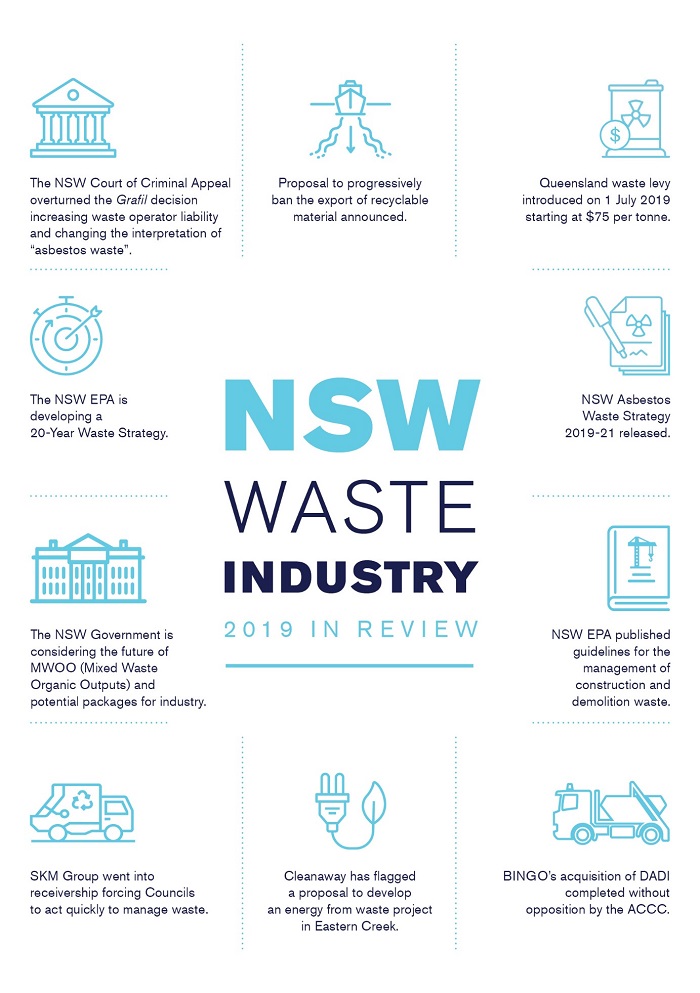In brief - The waste industry has continued to respond and evolve throughout 2019 to policy, rule and market changes and drivers. It is anticipated that 2020 will see further progress towards industry managing waste within Australia and creating a circular economy.
A snapshot of the key 2019 events impacting the waste industry is below:

What will 2020 bring?
Grafil case impacts on EPA investigations and prosecutions
One significant appeal from the Land and Environment Court to the Court of Criminal Appeal has had considerable implications for the waste industry. The decision in Environment Protection Authority v Grafil Pty Ltd; Environment Protection Authority v Mackenzie [2019] NSWCCA 174 (Grafil) overturned the NSW Land and Environment Court's 2018 decision which raised the bar for EPA investigations and prosecutions. As a result of the Court of Criminal Appeal's decision, the waste industry has had to deal with the following implications from the judgment reversing the position in 2018 and increasing consumer liability:
- Consumers bear the onus of proving that resource recovery exemptions apply because the consumer is seeking to avail itself of the exemption. This means that consumers need to have confidence in the supply chain of the material they are receiving together with all the necessary documentation to prove there is lawful authority to receive and use the material.
- The amount of asbestos that a stockpile or load contains, or its relative proportion to the volume of the stockpile or load, is not relevant to whether the material contains asbestos or not. If any amount of asbestos is present in waste, the entire load or stockpile is to be classified as "asbestos waste". It is not a matter of "fact and degree".
- The stockpiling of material (albeit temporary) constituted "waste disposal (application to land)", which is a scheduled activity under the Protection of the Environment Operations Act 1997 (NSW) requiring an Environment Protection Licence. Operators need to be careful about where they stockpile material and need to ensure the relevant approvals are in place - even if temporarily.
Ban on export of waste plastic, paper, glass and tyres a possibility
Following China's National Sword Policy introduced in 2018, this year, the Australian Government has announced its intention to ban the export of waste plastic, paper, glass and tyres. Whilst consultation is ongoing, the bans could commence as soon as 1 July 2020. This ban will force waste operators to adapt again to tighter market regulations.
It is yet to be determined if federal or state governments will provide assistance to industry to create new market opportunities and solutions needed to manage these waste streams effectively in Australia. However, in terms of timing and consultation, we expect that the lessons from the significant industry concern generated by the almost overnight revocation of the Mixed Waste Organic Outputs "MWOO" resource recovery order and exemption in 2018 will be well remembered in this new policy development.
Circular economy and energy from waste
Buzz words that showed no signs of fading in 2019 and are expected to continue into 2020 are "circular economy" and "energy from waste". The waste industry continues to work towards solutions for managing waste efficiently, sustainably, and with minimal impact to the environment and communities.
A new large proposal for one of the more controversial methods of waste management - energy from waste - has been announced and it will be interesting to see whether this project can obtain community endorsement or a "social licence" after the refusal of The Next Generation by the Independent Planning Commission in 2018.
| Todd Neal | Katherine Edwards |
| Planning and development | |
| Colin Biggers & Paisley |
The content of this article is intended to provide a general guide to the subject matter. Specialist advice should be sought about your specific circumstances.



